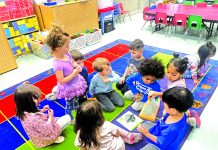On Feb. 8, El Marino Language School’s third grade students cooked Yakisoba, a Japanese stir-fry dish, using vegetables they grew in their own class garden.
The garden is integrated into the class’ science curriculum, in which students learn more about plant life and processes through caring and keeping a vegetable garden.
As their teacher Horiba Sensei explains, the students, “go every week to observe the garden—we put them in the ground and then we measure them every week to see how they’re doing. Then we count how many leaves, we also look at what color they are, if they are green—light green or dark green.”
Through interactions with the garden, the students have sharpened both their knowledge of plant life and their observational skills. They have learned to question the growth rates, colors and sizes of the plants.
Many even pointed to scientific variables as reasoning for the plant variation.
“They had an understanding of how things depended on variables, why things change. Why this one is growing and this one’s not growing,” said Horiba.
“The student’s concluded that, it’s because of the shade, or this one has more sun, this one isn’t being watered enough. It’s too cold.”
Horiba also notes that the project has heightened the student’s, observational skills.
“You have to be pretty observant to see if this one has a bug on it or it’s been eaten by something,” explained Horiba.
The gardening program started through El Marino’s connections to Nishiyamato Academy, a private Japanese day school in Lomita, CA.
As Horiba explains, their sister school, Nishiyamato Academy, emphasized the importance of implementing gardening into their curriculum, “they started a garden when I first came to El Marino at their school,” the school suggested that a garden was, “a great idea for our science unit. Because we have to do plants, we have to do things like how they pollinate, just basic structures of plants, so I kind of piggy-backed off of their idea.”
The garden has also been beneficial to student’s families. Parents have enjoyed receiving hand-picked vegetables from their students, and got the chance to interact directly with the garden last Friday.
Students and parents joined together to celebrate harvested cabbage, Chinese peas and green onions by cooking a Japanese stir-fry dish called Yakisoba. While students got to cut their harvested vegetables, their parents collaborated by washing and cooking.
The class chose to cook Yakisoba because it uses vegetables, and it’s cultural.
“It’s a Japanese dish, we all used chopsticks. They did the best they could,” said Horiba.
Like this garden, other gardens have been sprouting up in local Culver City elementary schools. As part of the Growing Great initiative, Culver City schools engage in gardening to help students strengthen their diets and learn more through nutrition education.
The gardening experience has helped make science classes more involved and hands-on. When asked how the students feel about this unique approach to learning, Horiba said, “They love it. They go yay! I think they like going outside and picking things.”
Nicole Powell is a freshman Communications and Journalism student at Loyola Marymount University in Los Angeles, CA. She has lived in Culver City all of her life and hopes to positively inform her local and global community through journalism.













